#auxiliary fi
Text
Anon wrote: I'm an ENFP, I'm 30 years old and I’m really needing to work on my self-confidence for me and for dealing with people. I’ve read in our blogs some posts that reinforce the importance of developing skills to have confidence. I think it's very legitimate.
In this process of learning new things, I often find myself in great difficulty and my inner child agonizes with insecurity. I look at friends who have confidence in themselves as something natural: confidence that they will learn, confidence in themselves, but unfortunately I am very unstructured (poor growth environment, without incentives), so I have a lot of difficulty trusting myself: especially being so inexperienced, clumsy and slow to learn everything.
What gets worse is being in environments where people don't have patience with beginners. Like now I'm living in a foreign country where people are very rude in the workplace. This hurts me a lot, because I have problems asserting myself and being respected. I discovered that they need rudeness to respect others. How to deal with this? Would I be able to impose myself without getting nervous and acting rude (as they usually have to do)?
And more, how can we learn from this situation? How can I be truly confident and also how can I simply demonstrate more confidence to make myself respected? I'm tired of conveying weakness. People don't value my sweetness it's not a good tool for me right now. How to develop self-confidence, at least start to demonstrate a little confidence and boundaries! And in the midst of this, the most important thing: how do you deal with such unpleasant people? Especially me being used to being such a sweet, "silly" person, always with my guard down, calm and considered weak by others.
---------------------
You seem to be talking about two issues that need unpacking separately: 1) personality, and 2) confidence.
You're having a personality clash with the people at work. Analytical psychology posits that personality clashes are disturbing because they remind you of negative things in yourself you dislike, so there is a need to go within to see what's really happening.
To be clear, I'm not denying that toxic people/environments exist. I believe your description and I would certainly dislike the workplace myself. The point I'm making is, when you have no choice but to be in that sort of environment, there are healthier ways to navigate it, but being judgmental about people is not a healthy way. Judgmentalness is a sign of projection, which is an unhealthy defense mechanism, see previous posts on the topic.
One basic thing type theory teaches us is there are different people in this world. Therefore, one must always begin with acceptance of differences, if one hopes to have healthy relationships in every realm of life. You've come to identify with the so-called "sweet" aspects of your personality. When you identify with one side of yourself, you tend to unconsciously valorize that side, otherwise, you might end up hating yourself. However, in the process of valorizing that side, you inadvertently end up denying, devaluing, dismissing, or denigrating its opposite. It's no accident that these "rude" people trigger you. They bring to light your unconscious self-rejections.
Workplace = professionalism. To succeed in any workplace, it's important to set a clear boundary between private and public. It isn't appropriate to use the workplace to hash out personal issues. E.g. It's not a place to play games about who you favor or dislike. It's not a place to seek validation to soothe your insecurities. I would even argue it's not a great place to seek friendship or companionship. When you bring the personal into the professional, you are more likely to create mess, drama, discord, and conflict. Of course, there are people who live for messiness. Ask yourself exactly what role you want work to play in your life and behave in accordance with those values/principles in every workplace.
When you describe yourself in mostly positive terms ("sweet") and describe other people in very negative terms like "rude", "impatient", or "unpleasant", there is a possibility that you are biased. Typism is a bias. It means you believe some personalities/traits to be superior or inferior to others. ENFPs typically hope to get along well with all sorts of people. If you hope for that, you need to eliminate typist thinking. This requires learning to always approach people in a neutral/professional manner, even when you dislike them at first. You don't know the full story behind people. Oftentimes, the majority of people in toxic environments are just like you, i.e., struggling to survive and doing whatever it takes to keep out of trouble.
When you approach people in a neutral/professional manner, you should adopt an objective perspective about them. Yes, you see their faults, but you shouldn't lose sight of their redeeming qualities. When you're being judgmental, you're likely to dismiss people whole-hog, unable to see their redeeming qualities. Being blind to the positive means you lose opportunities for improving the situation, which means losing hope, which means losing self-confidence as you feel more and more passive and helpless.
How about, instead of using the word "rude", call them "direct" or "candid"? Instead of "impatient", how about "efficient"? When you use more neutral language to characterize people, you reinforce the idea that every personality trait has its pros and cons. When you can finally visualize the upside, you can harness it to your advantage. This allows you to let go of negative feelings and focus on the work itself. Nobody is asking you to marry these people. All you have to do is work with them long enough to get stuff done. Keep your feelings to yourself and stick only to the facts. Once work is done, go home, put it out of your mind, and get on with the rest of your life. If there are things you need to learn to improve your performance in the workplace, spend time on self-improvement outside of work in order to speed up your progress.
.
With regard to confidence, when people bring up "lack of confidence", they often conflate several different concepts including: self-confidence, self-efficacy, self-esteem, and self-worth. It can be a complicated topic, so I'll elaborate on it for future reference. Some non-native English speakers have mentioned to me that their native tongue doesn't have direct translations for these four concepts, so beware that language might be a barrier for understanding them.
These four terms are relatively new in English as well; it wasn't until recently that they've started to filter down from academia into mainstream vocabulary. We know that these four concepts are distinct because, in the course of examining people who fall broadly under the category of "confidence issues", psychologists discovered that different people had somewhat different underlying processes happening, e.g., you could be good with one but struggle with the others. Of course, over time, how people use these terms in everyday language gets fuzzy, as the meaning diverges from the original academic definitions. I'll explain my understanding of them. You specifically mention learning issues, so I'll also connect to that.
I. SELF-CONFIDENCE arises from the degree to which you feel in control. If you 1) have good self-control, 2) feel as though you mostly have control over the direction of your life, and 3) feel as though you have enough control over your environment, then you're likely to feel self-confident. Thus, reflect on whether you feel some deficits in any of the above. There are things you can do to get a firmer sense of control.
Self-control is sometimes related to discipline, which means the ability to delay immediate gratification for a more important future goal. If you tend to be spontaneous, impulsive, or rebellious, then it's easy for you to lose sight of the bigger picture and it's hard for you to follow good learning procedures, which can easily derail your learning process. Some ways to improve your self-control over time:
improve your big-picture thinking so that you don't forget about your ultimate goal (through Ne)
learn the value of following good methods/procedures for achieving a goal (stop resisting Si)
structure your environment more intentionally to eliminate distractions/temptations and reward progress (tap into Te)
Having enough control over the direction of your life often relates to your ability to make good decisions. If you tend to be very emotional, indecisive, or easily overwhelmed by too much information, then it indicates you don't have a good system for processing the information required to inform your decisions. One way to improve your information processing ability is to improve your critical thinking skills. Critical thinking involves parsing information correctly, understanding its meaning, and systematizing information, in service of determining the best course of action (see past posts and recommended books). When learning, not being able to organize information and create feasible plans means slow progress.
Feeling a sense of control over the environment is often related to problem-solving skills. What happens when you meet a problem or challenge? Anxiety? Panic? Anger? Spiraling out of control? To have good problem-solving skills involves: deducing cause and effect, analyzing situations objectively, drawing valid conclusions, and generating good ideas and action-plans. Problem-solving is an important part of the critical thinking skills mentioned above. The process of learning is never completely smooth. You are bound to meet challenges and obstacles, so how do you address them? Self-confident people don't tend to focus on how they feel about problems, rather, they mostly focus on the problem itself and try to solve it as quickly as possible. When the problem is gone, the negative feelings go away.
II. SELF-EFFICACY arises from the degree to which you have faith in yourself, specifically your abilities. Efficacy means being able to bring forth an intended result (effectively) or reach an intended goal (efficiently). When you meet a problem/challenge, do you believe you have enough knowledge and skill to overcome it? If so, you have good self-efficacy. If not, do you believe, with enough dedicated learning and improvement, you can overcome it eventually? That is also good self-efficacy. In essence, it means you believe in yourself, with regard to possessing the resources or being able to obtain the resources necessary to succeed in reaching your goals.
Self-efficacy is sometimes related to competency and mastery. Being young and inexperienced, it's normal to have lower self-efficacy than someone older and wiser. In the learning process, it's important to have compassion for yourself and evaluate your progress fairly. Is the level of competency/mastery you expect from yourself proportional to the reality of your situation? If you haven't had many learning opportunities, through no fault of your own, then you shouldn't feel ashamed for being a bit "behind". This is NOT a personal flaw/failing that deserves punishment.
Note that "ahead" or "behind" are relative terms, meaning they can be understood from different perspectives, so are you using the right perspective? For example, are you evaluating yourself through your own eyes, through the eyes of your rivals, or through the eyes of an expert on the subject matter? Use fair and reasonable benchmarks/standards to measure where you are and where you should be. One reason people of any age suffer self-doubt is because they are too honest about what they don't know or can't do, to the point where they become dismissive of what they do know and can do. It's very important to be objective and balanced when assessing what you lack by also fully recognizing what you already possess or have achieved so far.
In my humble opinion, I believe people already possess everything they need to have good self-efficacy. Human beings evolved to be adaptable and that is largely how they have succeeded as a species. You have the capacity to learn and adapt to your environment. Get back in touch with it, have faith in it, and harness it as necessary. Instead of thinking there's only ONE WAY things should/must go, be more flexible and open to alternatives (use Ne).
III. SELF-ESTEEM refers to how you generally feel about yourself. This is usually related to the kinds of beliefs you have about yourself and the part they play in constructing your self-concept. The beliefs you have about yourself (e.g. about who you are and what you are capable of) are heavily influenced by your past experiences.
One of the most common signs of low self-esteem is negative self-talk. Observe the kinds of things you say to yourself in your head. Is it mostly negative, neutral, or positive? If it's mostly negative, how are you meant to feel good about yourself? People with low self-esteem say very nasty things to themselves that they would never dream of saying to others. Why the double standard? As a "sweet" person, you have empathy for others, so be sure to extend the same empathy to yourself.
An example related to learning: I've unfortunately known too many students to abandon a subject simply because one of their (jerkass) teachers told them they would never be good at it. The negative experience led them to form the belief that "they weren't meant to study it" and couldn't succeed even if they tried. Every time they encountered the subject, the belief would rise up and they'd talk themselves out of trying. Of course, watching themselves fall further and further behind through repeated failures made them feel worse and worse about themselves. Self-esteem can be damaged in a vicious cycle: By believing the worst of yourself, you aren't properly motivated to learn and improve, and then you meet failure after failure, which then confirms your negative beliefs about yourself.
One good way to tackle low self-esteem is cognitive-behavioral therapy. A cognitive-behavioral therapist is trained to bring to light your underlying beliefs (and how they interact with your feelings and behaviors). By bringing unrealistic beliefs into consciousness, you open up space to change them or adjust them to be better aligned with reality. Perhaps you need to reflect on the beliefs you have about yourself, regarding who you are/aren't, who you're supposed/not supposed to be, what you hope/don't hope to be, what you are/aren't capable of, etc. Are your beliefs attuned to your current reality? Negative past experiences don't have to dictate your future, but they will if you're unaware of how they still influence you today.
IV. SELF-WORTH refers to feeling "good enough", specifically whether you believe you are worthy of acceptance and love. When you're young, your sense of self-worth arises in large part from how you were regularly treated by the people around you. If you grew up in an environment where love was conditional, then your self-worth likely became tied to those conditions. For example, if your parents only show you love when you get As in school, it's likely that your self-worth will become tied to your academic performance and future professional success.
Self-worth can also be damaged in a vicious cycle. If you believe you aren't worthy of love, then you signal to others that it's okay to treat you poorly, which reinforces the idea that you aren't worthy. One common way people defend against low self-worth is to make themselves into something "better" or more "worthy" to their social environment, or to obtain something they can offer in exchange for social validation of their worth (e.g. wealth or status). This striving can lead to problems with overachieving, perfectionism, anxiety, depression, self-blame, or self-harm.
One common way to tell if you suffer self-worth issues is if you are often engaged in social comparison that leads you to envy people you deem somehow "superior" to you and/or feel shame about being "inferior" to them. If that's the case, it's likely that you need to correct some faulty thinking patterns:
Don't make illogical comparisons, such as comparing your first step against someone else's thousandth step. These kinds of illogical comparisons exacerbate feelings of unworthiness. You're inflicting pain upon yourself by thinking this way.
Don't be superficial and judge people only by their cover. Remember, you don't really know what someone went through to get where they are today. Perhaps if you knew the full story, their situation wouldn't seem very enviable at all. Maybe you want to play golf as well as Tiger Woods, but would you also want to give up your childhood and constantly suffer harsh treatment as he did?
Don't expect that every person should be the same, know the same things, have the same abilities, live the same life, etc. Respect individuality, which means allow for differences between yourself and others. Understand that everyone has their own path in life rather than believing everyone should conform to the same crude standard (i.e. avoid Te loop).
Do you desperately need everyone to like you or think you're great? Wanting the approval of toxic people is basically granting them power over you. Don't hurt yourself by trying to become something you're not just because someone triggered your insecurity. Insecurity is your problem, not their problem. It is the insecurity itself you need to face up to by reflecting on where it really comes from and what it says about your ability to accept and love yourself as you are (this is related to problems with Fi development in ENFPs).
What many people with low self-worth don't understand is that self-worth starts from within; it doesn't come from the people out there. When you're able to accept and love yourself and stand proud in who you are (without all those "conditions" that were imposed upon you earlier in life), you'll then be capable of teaching others to respect you. With healthy pride in yourself, it's far easier to be assertive, set boundaries, and advocate for your needs. Why? Because you firmly believe you matter, you have a right to the space you inhabit, you have a right to be yourself, and you deserve to be treated as an equal. It's also easier to ignore, dismiss, or eject toxic people when you finally realize that you don't need or want anything from them.
All four of these concepts relate to how you perceive and evaluate yourself, but from different angles. You mention feeling insecure, but which of the above gets closer to the root of the issue? It's important to be more precise about identifying the problem if you hope to come up with the right solution.
#enfp#auxiliary fi#te loop#self confidence#self efficacy#self esteem#self worth#social comparison#envy#judgmental#self compassion#critical thinking#workplace#career#adaptability#typism#ask
29 notes
·
View notes
Text
every time i open gale’s personality database profile and see the overall consensus i Despair™. this man is not an entp and neither a 7w6.
#the ‘all enfps are dumb happy-go-lucky golden retrievers who couldn’t focus even if their life depended on it’#cliche is finally catching up with us#enfps can be logic driven & highly intelligent#begging you to learn about cognitive functions#and how auxiliary Fi actually manifests#instead of just going with the popular vote#anyway he’s an enfp 3w4 so/sx#i will elaborate more on that later (once i’ll catch a break from work)#mbti tag#it speaks#gale dekarios
6 notes
·
View notes
Text
Hmm one day I’ll have to figure out my characters’ MBTI types.
#Personal#To be fair I’m super interested in this topic but#I’m just not sure my typing will be objective enough because most of them got their types on the very early stages of my writing x)#Anyway for now I’m sticking with Valerio being an ENFJ or ESFJ#He’s clearly a Fe dom user but honestly I’m not sure about his auxiliary function#I mean he might seem dwell into his past but he’s rather ignoring it which is why it can’t let him live a normal life#Hmm does it mean he’s in the Fe-Ne loop?#Like he tries to find different possibilities for having a bright future#but since he doesn’t rely on one of his main functions (Si) it doesn’t work out#Wait it does make sense#Akajjdkfm but I want him to be an ENFJ#I’ll need to think about it deeper someday#Okay so Ángel is clearly an ESFP and Frida is either an INFJ or INTJ#Matías seems like a Ti dom user because in his and Valerio’s duo he’s the one who always holds a braincell so he’s an ISTP#Emilio is an INTJ and he seems to be in the Ni-Fi loop#Verónica hmmmm ENTP maybe?#To be fair I barely know anything about her so I really don’t know XD#But she’s creative and can think objectively which does sound like NeTi I think#And INTJ and ENTP are the perfect match :D#As for Leticia I need to write her more often to figure it out but for now I think of her as an ENFP#And Gabe himself is an ESTJ#Wait wait wait wait coming back to Valerio’s MBTI#He does seem to be in the Fe-Se loop as well considering how much he cares about what other people will say about his scars#Like he cares about his image A LOT and wants others to perceive him as a wise and kind Señor Álvarez even though he’s not really is#And he tries to distract himself from his dark thoughts and memories via the sensory world which is kinda why he became a teacher#He just HAD to do something so he wouldn’t lose his mind#Plus the main thing about his arc is not accepting his past (although it’s still a big part of it)#but rather finding a true purpose in his life which is not teaching actually#Anyway Valerio clearly can’t be in both loops at the same time it’s just me trying to figure out his actual type aksjdmkf#But idk I might be biased but him being an ENFJ sounds more realistic because really he never used Si even when he’s not under stress
11 notes
·
View notes
Text

Hard Light - Solid hologram; functions like glass. See through, shatterable. Can be used like a weapon when formed in a sharpened state.
@rockwell-light 's AU boy because I cannot resist drawing him ✨
10 notes
·
View notes
Text
google what do u when ur self-reflection for self-improvement turns against you and now you’re worse
#aka i tried figuring out my cognitive functions for mbti and idk anything anymore the world is dark and dreary#i KNOW i’m an fi dom/auxiliary#actually no i don’t#k think i am#and my ne is non existent so i guess it’s se#so i’m either an isfp or esfp?? BUT IT DOESNT MAKE SENSE NOTHING MAKES SENSE IM LOSIJG JT
3 notes
·
View notes
Text
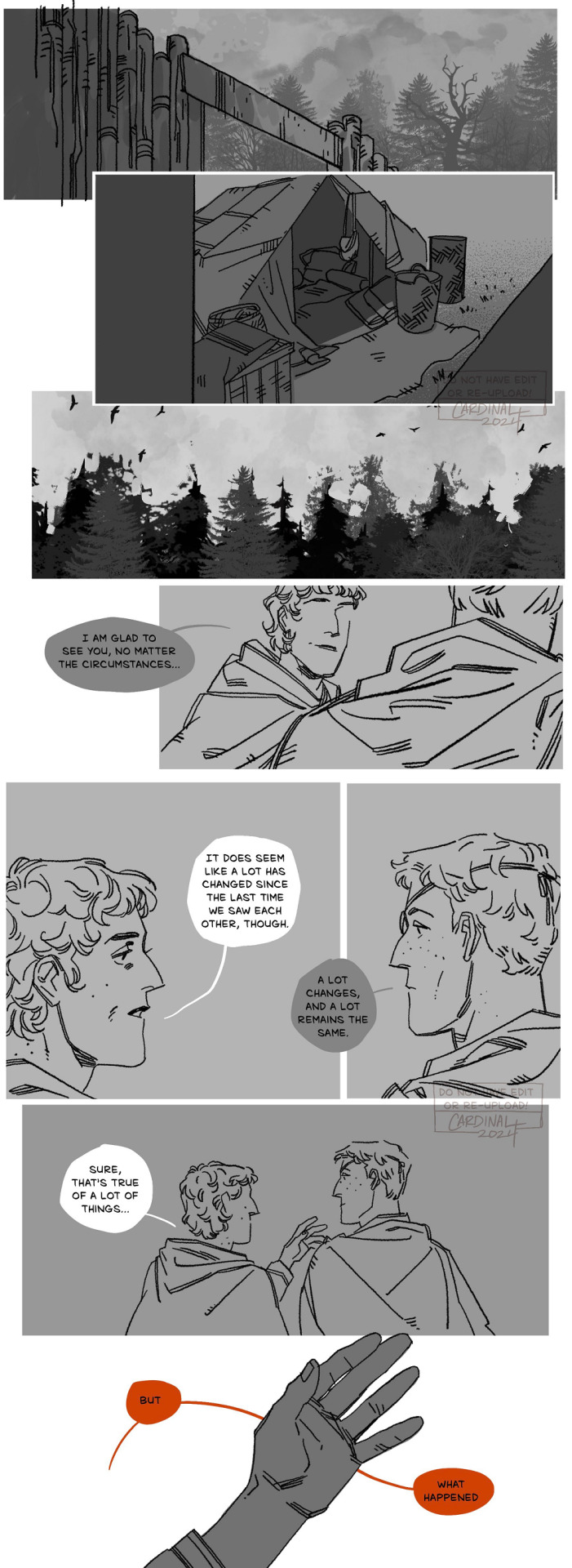
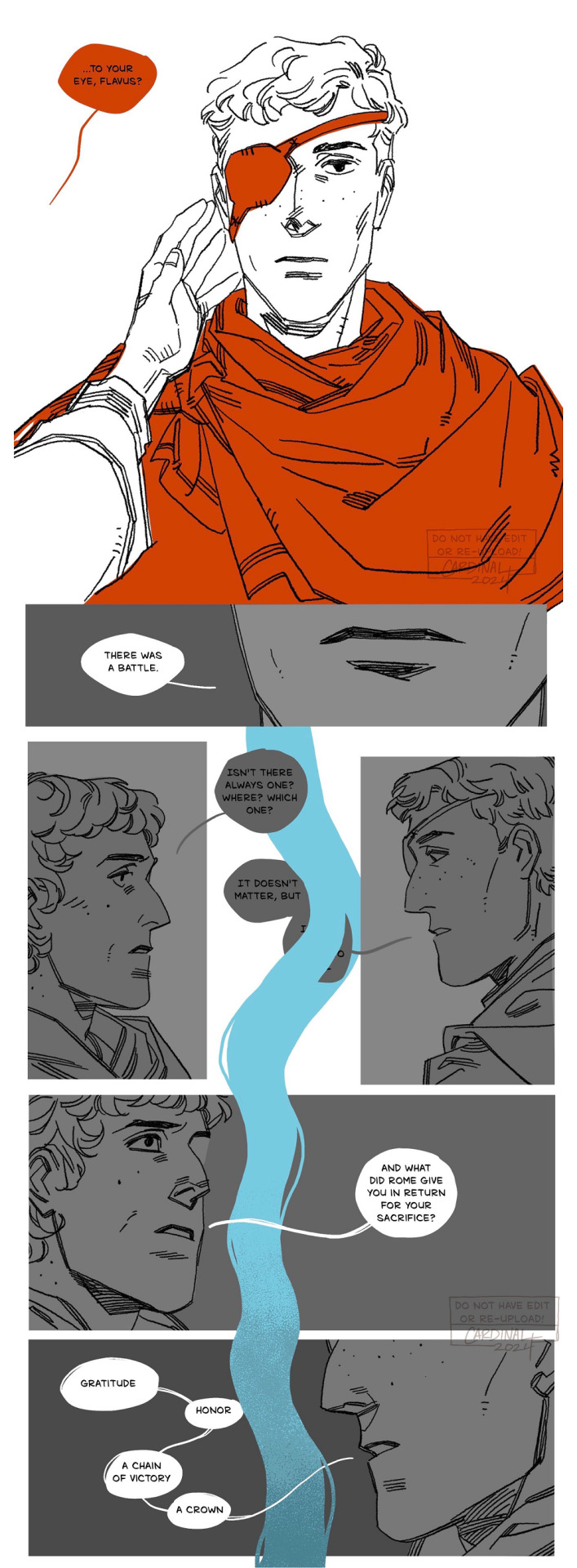
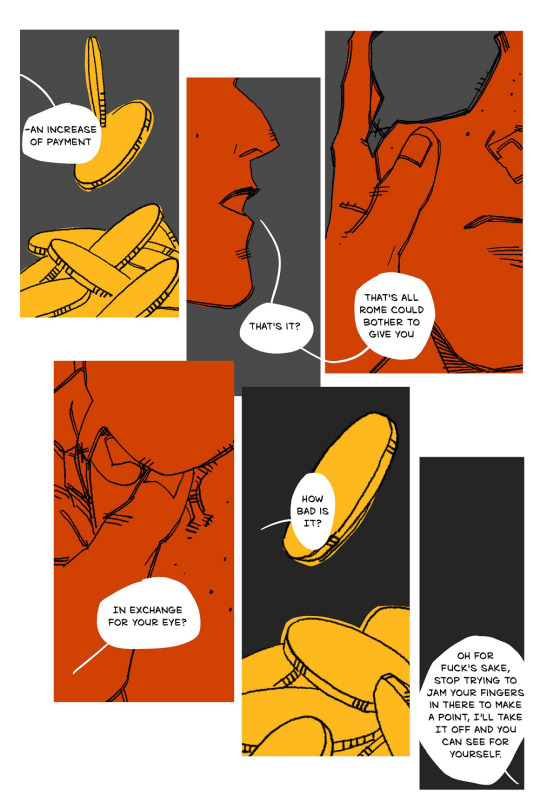
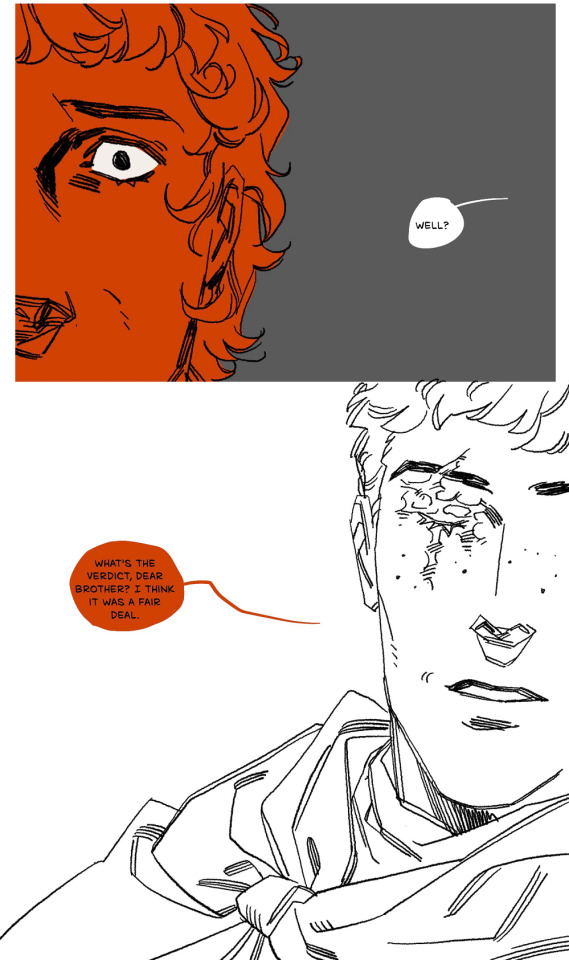
BROTHERS
The river Weser ran between the Roman and Cheruscan forces. Arminius came to the bank and halted with his fellow chieftains:— "Had the Caesar come?" he inquired. On receiving the reply that he was in presence, he asked to be allowed to speak with his brother. That brother, Flavus by name, was serving in the army, a conspicuous figure both from his loyalty and from the loss of an eye through a wound received some few years before during Tiberius' term of command. Leave was granted, and Stertinius took him down to the river. Walking forward, he was greeted by Arminius; who, dismissing his own escort, demanded that the archers posted along our side of the stream should be also withdrawn. When these had retired, he asked his brother, whence the disfigurement of his face? On being told the place and battle, he inquired what reward he had received. Flavus mentioned his increased pay, the chain, the crown, and other military decorations; Arminius scoffed at the cheap rewards of servitude.
They now began to argue from their opposite points of view. Flavus insisted on "Roman greatness, the power of the Caesar; the heavy penalties for the vanquished; the mercy always waiting for him who submitted himself. Even Arminius' wife and child were not treated as enemies." His brother urged "the sacred call of their country; their ancestral liberty; the gods of their German hearths; and their mother, who prayed, with himself, that he would not choose the title of renegade and traitor to his kindred, to the kindred of his wife, to the whole of his race in fact, before that of their liberator." From this point they drifted, little by little, into recriminations; and not even the intervening river would have prevented a duel, had not Stertinius run up and laid a restraining hand on Flavus, who in the fullness of his anger was calling for his weapons and his horse. On the other side Arminius was visible, shouting threats and challenging to battle: for he kept interjecting much in Latin, as he had seen service in the Roman camp as a captain of native auxiliaries.
Tacitus Annals 2.10-11
there's a lot going on in there! Arminius switching to Latin is a detail that always makes me feel a deep kind of sadness, especially with how it's preceded by mention of their mother. I wonder what she thought of what became of her sons, on opposite sides of everything but still, inescapably, brothers. even when they want to kill each other. there sure are a lot of fucked up and unhappy brothers around. and Arminius asking about Flavus' injury............I also had a whole thing typed out about the horror of imperialism and colonization and the trauma of assimilation but I think this sets the tone better



Rome's Greatest Defeat: Massacre in the Teutoburg Forest, Adrian Murdoch
and also this, just for fun

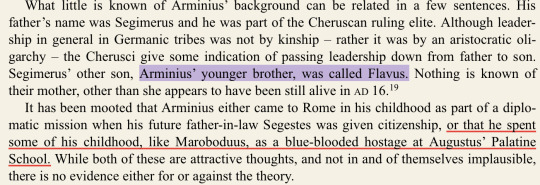

(ibid)
this post is already a mile long, so lets add another mile to it: a little scene at the start of their conversation! tfw you go in for a hug and your younger brother who also ended up being taller starts roasting your hair style
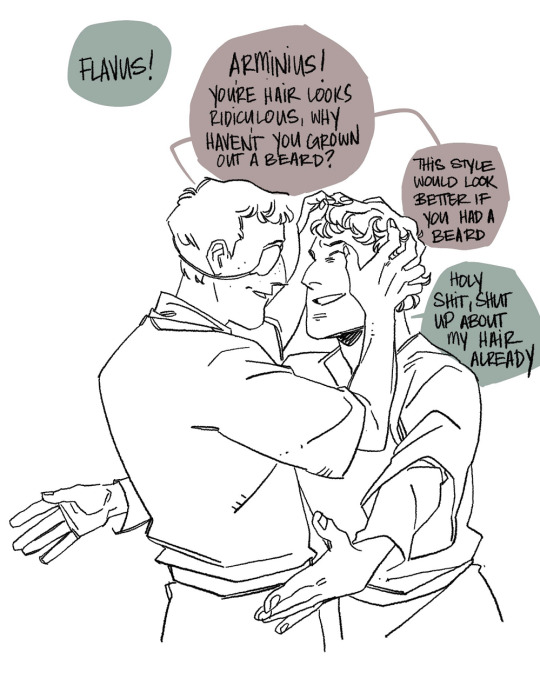
bsky ⭐ pixiv ⭐ pillowfort ⭐ cohost ⭐ cara.app⭐ko-fi
#long post#SO LONG#roman empire tag#tbh im not jazzed about using that tag when rome is not actually the setting here but i do not have a good era tag for this yet#i'll figure it out later eurhghghesuerhgh#komiks tag#arminius & flavus#idk. maybe also#eye trauma cw#anyway it's all very 'he's my brother and i need a shovel to love him' kind of deal#this (wheezing) this is an idea i had LAST YEAR but it was a solo illustration#i had it posted for about ten minutes before i decided it sucked ass and needed to be revisited as a comic#FINALLY. the idea is complete. im free. it's been bothering me to have it unfinished while the original idea was haunting my drafts#as a reminder to get it done. and now i can delete it. au revoir illustration you will not be missed
333 notes
·
View notes
Text
Mbti & Astro Observations (5)



They're my personal observations, so take it with a grain of salt.
🪐 Saturn in the 1st house may have an awkward body or the way they lay, sit, stand, walk, etc. is awkward. It's hard for them to relax their body. Their firm body reminds me of a group of soldiers marching in the military.
🦂 Scorpio Moons like to show their expressions as if they're subtly unhinged. You may find their expressions strange and be confused if they're bad or normal by their expressions. But you're attracted to them because anything unknown unconsciously draw people in.
🌑 Pluto influence may make someone have a strong jaw. Or they may look like they hold their anger in like they hold their teeth tightly when someone upset them makes the end of their lips downwards. I think they do feel like that commonly. I associate Pluto with Ni and Fi. I found some dominant Fi users have this feature.
Ex: Aubrey Plaza (ISFP), Jenna Ortega (INFP), Blackpink's Jennie (ISFP)
🩷 Venus in the 1st house, Libra Rising or Libra Moon may exhibit strong Fe traits. Libra Moon eyes are average-sized and give a pretty, charming, and gentle look.
Ex: Beyoncé (Libra Rising, Venus in the 1st house, ESFJ), Mehgan Markle (Libra Moon, ENFJ), Selena Gomez (Venus in the 1st house, ISFJ), Arianna Grande (Libra Moon, ESFJ), Twice's Mina (Libra Moon, INFJ), Madison Beer (Libra Moon, ENFJ), Olivia Rodrigo (Venus in the 1st house, Libra Moon, ESFJ), Jennifer Aniston (Libra Rising, ESFJ), Harry Styles (Libra Rising, Libra Moon, ENFJ), Angelina Jolie (Venus in the 1st house, ESTP)
🌙 Also, people who have strong Cancer placements, especially Cancer Moon and Sun, Moon Conjunction Midheaven, or in the 10th house may exhibit strong Fe traits.
Ex: Prince William (Cancer Sun, Cancer Moon, ISFJ), Kate Middleton (Cancer Moon, ISFJ), Meghan Markle (Cancer Sun, Cancer Rising, ENFJ), Taylor Swift (Cancer Moon, ESFJ), Selena Gomez (Cancer Sun, Moon Conjunction Midheaven, ISFJ), Jennifer Aniston (Cancer Midheaven, ESFJ), Angelina Jolie (Cancer Rising, ESTP), Arianna Grande (Cancer Sun, ESFJ), Olivia Rodrigo (Moon Conjunction Midheaven, ESFJ), Twice's Dahyun (Cancer Moon, ESFJ), Aespa's Karina (Cancer Moon, ESFJ)
🌹 Some suspect Blackpink's Rosé to be a Libra Rising and Cancer Midheaven. Coincidentally, she's an ESFJ.
🌓 Sun trine Pluto are passionate people and influential leaders. They love what they do and are the masters of what they love. Everything they achieve seem legendary because they follow their true path. Everything falls into place when you follow your dream. They may have Fi and Ni in their stack. Both Fi and Ni are passionate about what they love.
Ex: Suga (INTJ), Blackpink's Lisa (ESFP)
🌫 Easy aspects (trine, sextile) try their best not to sound like they attack someone in the way they talk, act, etc. They look like someone who gives advice because they genuinely want to help people to be better. They probably got compliments about the traits belonging to those aspects from people in the past. They give off a peaceful and gentle vibe even with Mars, Saturn, and Pluto soft aspects.
🪨 Hard aspects (opposite, square) always talk and act like they attack someone, and someone attacks them. They likely experienced people with the traits belonging to those aspects attacking them in the past. They feel everyone come at them. You think they attack you, but they probably attack their imaginating ghost in the past. They may still be as true as the ones with easy aspects but sound harsher.
🔥 Mars in the 1st house or Aries Rising just looks hot. Their eyes are sharp, pointed upwards, and fierce-looking. They may likely be the sensing types, especially dominant/auxiliary Se users since Mars rules the bodies.
Ex: Kris Jenner (Mars in the 1st house, ESTJ), Rihanna (Aries Rising, ISFP), Megan Fox (Mars in the 1st house, ISTP), Kendall Jenner (Aries Rising, ISTJ)



#astrology#mbtiastro#mbti#mbti astrology#saturn in the 1st house#scorpio moon#mars in the 1st house#aries ascendant#cancer sun#cancer moon#pluto#sun trine pluto#hard aspects#easy aspects#trine#sextile#square#opposite#venus in the 1st house#libra ascendant#libra moon#Fe#Fi#Se#Si#Ni#astrology observation#mbti astrology observation
381 notes
·
View notes
Text
Les temps du passé
Le plus-que-parfait
The pluperfect is made of two words: an auxiliary (être or avoir, depending on whether the action happens to the subject's body or not) conjugated in the imperfect tense and a past participle.
j'étais, tu étais, il était, nous étions, vous étiez, ils étaient
j'avais, tu avais, il avait, nous avions, vous aviez, ils avaient
It is used to talk about the past in the past: j'avais fermé la porte quand tu es rentré - I had locked the door when you came home.
Nous étions parties - we were gone
J'avais fait la vaisselle - I had done the dishes
L'imparfait
The imperfect, one of the most common past tenses, is made of one word and used to describe the past (former habit, historical detail, description) or a long-term action.
La maison était très grande - the house was very big
Les soldats dormaient peu - the soldiers wouldn't sleep much
J'allais nager tous les dimanches - I used to go swimming each Sunday
La conjugaison
j'allais, tu allais, il allait, nous allions, vous alliez, ils allaient
je finissais, tu finissais, il finissait, nous finissions, vous finissiez, ils finissaient
je pouvais, tu pouvais, il pouvait, nous pouvions, vous pouviez, ils pouvaient
Le passé composé
The perfect tense is the younger sibling of the pluperfect: it is built the same way but the auxiliary is conjugated in the indicative present instead of the imperfect.
je suis, tu es, il est, nous sommes, vous êtes, ils sont
j'ai, tu as, il a, nous avons, vous avez, ils ont
For compound tenses, been (été) is added in case of a passive voice. It is used to refer to the action, a short-term event that is already done and only happened once.
Ils ont mangé les derniers raisins - they have eaten the last grapes
Je suis partie hier matin - I left yesterday morning
Le passé simple
The simple past, usually learners' least favourite tense, is the pompous, literary equivalent of the perfect tense. It is built with a single word and the first and second-person plurals get a circumflex accent.
je fus, tu fus, il fut, nous fûmes, vous fûtes, ils furent
j'eus, tu eus, il eut, nous eûmes, vous eûtes, ils eurent
j'allai, tu allas, il alla, nous allâmes, vous allâtes, ils allèrent
je fis, tu fis, il fit, nous fîmes, vous fîtes, ils firent
je pus tu pus, il put, nous pûmes, vous pûtes, ils purent
Le conditionnel passé
The past conditional is another compound tense: it is built with an auxiliary conjugated in the present conditional and a past participle.
je serais, tu serais, il serait, nous serions, vous seriez, ils seraient
j'aurais, tu aurais, il aurait, nous aurions, vous auriez, ils auraient
It expresses regret or a theory/fantasy.
Je serais venue tôt si tu m'avais prévenue - I would have come early if you had warned me
Il aurait voulu être un artiste - he would have wanted to be an artist

Le passé antérieur
The perfect past, another compound tense, is built with an auxiliary conjugated in our good friend the simple past and a past participle.
je fus, tu fus, il fut, nous fûmes, vous fûtes, ils furent
j'eus, tu eus, il eut, nous eûmes, vous eûtes, ils eurent
It is only found in old novels and expresses the anteriority of an action compared to the one that follows: it is a posh version of the pluperfect.
Il eut vite choisi un cadeau - he quickly picked a gift
Je fus étonnée de te voir à la fête - I was surprised to see you at the party
Le passé récent
The recent past is built with the verbal phrase venir de conjugated in the indicative present and followed by an infinitive.
je viens de, tu viens de, il vient de, nous venons de, vous venez de, ils viennent de
It is very common and refers to an action that just happened.
Je viens de finir de manger - I just finished eating
Nous venons de rentrer - we just got home
L'impératif passé
The past imperative is built with an auxiliary conjugated in the present imperative, an absence of pronoun, and a past participle. It only exists in the second-person singular and first and second-person plurals.
sois, soyons, soyez
aie, ayons, ayez
It expresses the anteriority of an action (order, prohibition, suggestion, plea) compared to the one that follows]
Aie rangé ta chambre avant que je rentre - have your room tidied before I get home
Soyez partis pour neuf heures - be gone by nine
N.B. This is not that common anymore especially for avoir, natives typically will use tu as intérêt à être/avoir--- (you better be/have---) or use another verb to sound more polite: essayez d'être partis pour neuf heures - try to be gone by nine
L'infinitif passé
The past infinitive is another compound tense built with an auxiliary conjugated in the present infinitive and a past participle.
être
avoir
It expresses the anteriority of an action accomplished before the one that follows and is mostly used in written instructions.
Être levé à l'heure est important - being up on time is important
Avoir garder la cuisine propre est attendu svp - keeping the kitchen clean is expected please
Le participe passé
The past participle is the second element of compound tenses to express an action that happened in the past.
-s, -se, -s, -ses
-ø, -e, -s, -es
-us, -ute, -us, -utes
It works like an adjective, is often short and contains many irregular verbs.
Elle a fait ses valises - she has packed her suitcase
Ils ont ouvert la porte - they have opened the door
Nous sommes morts - we are dead
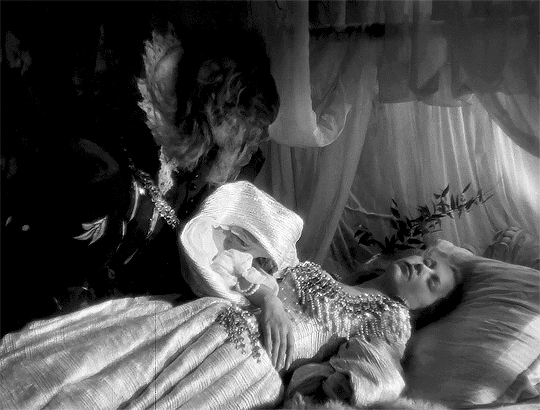
Movie: La Belle et la Bête - Jean Cocteau, 1946
226 notes
·
View notes
Text
QUICK CHAT ABOUT COD CHARACTERS AND THEIR MBTI TYPES PT 1.
Hi!!! So, I was just scrolling through Tumblr late at night and I saw some headcanons, where the creator mentioned Ghost's MBTI. It reminded me that I had a word file saved, discussing about the characters and their MBTI. But, I haven't finished it, so I'll just ramble some of my thoughts here instead.
I want to begin with Ghost. Seriously, I genuinely want to understand why people type him as an INTJ, the guy is not a Ni dom at all. And also, let’s just exclude here any chance of him being an INTP. But, I do see Ti and Ni in his functions. In my opinion, he is an ISTP 5w6. For those unfamiliar, ISTPs have Ti (dominant), Se (auxiliary), Ni (tertiary), and Fe (inferior) in their functions.
I'll be honest, this inferior Fe makes me doubt a bit because Ghost seems much more like a Fi user. However, considering that Fe is inferior and theoretically his weakest function, it makes sense. And, to me, what makes ISTP the most obvious choice is that this man really isn't a Ni dom or a Ne aux type. But like I said, I do see some Ni in him, but very weak, which excludes the possibility of him being a Ni dom, and adds the possibility of him being a Ti dom. But, he has zero Ne, so he can’t be an INTP. Just to clear things up, I don't think analysts can't be impulsive or that sensors are dumb, not at all. But they do have some tendencies, and you can see differences in how they deal/view the world.
So, let me give an example of a character who's an analyst: Laswell. She's the embodiment of an INTJ. Price and Ghost deviate so much from her. Both of them should have both Ni auxiliary and Ni dominant, respectively. The way both of them deals with Shepherd and Graves betrayal makes it very clear how they aren't intuitive types for me. They’re incapable of seeing the other side of the situation. And I know it might sound like a crappy argument, but speaking as a Ne aux, I always open myself to possibilities even if I DISAGREE, especially if I can benefit from it. You know who else does that? Laswell. A Ni dom. It's very clear her Ni/Te, and that's why compared to Ghost, I don't understand why people type him as an INTJ. Personally, I think Ti and Ni can be easily mistaken. And for me, Ghost's Ti is pretty obvious, the way he is practical, and how he analyzes things, and his Se aux helps him to be very aware of his surroundings (of course, there are more than that in Se aux). But to me? there's nothing more Ti/Se than that. I'll just drop here two brief descriptions of Ti/Ni dom that make me pretty sure Ghost isn’t a Ni dom.
"Introverted Intuition seeks underlying patterns that can predict how events will unfold in the long term. The primary goal is to understand cause and effect accurately, enabling confidence in problem-solving and avoiding causing issues. Individuals with this dominant function tend to be 'perceptive,' often capable of 'seeing through' situations by finding the 'real importance' or 'essence' or 'root' or 'meaning' of things and understanding the fundamental factors that will influence how situations unfold, connecting past, present, and future considerations in non-linear ways. They unconsciously seek vaguely familiar patterns of contextual variables and tend to gather multiple perspectives to synthesize and visualize 'the true truth' or a better version of life. In this way, they tend to be quite certain about how they want their lives to unfold, usually aspirational in pursuing meaningful goals with focus and determination as they seek to realize their personal potential."
"Introverted Thinking seeks to discover rules or direct formulas based on facts to guide thinking and behavior towards greater consistency and coherence. People with this dominant function tend to be highly analytical, preferring to adopt positions/judgments that are as free from biases or undue influences as possible. They often enjoy building skills and accumulating technical knowledge by systematically analyzing and deconstructing ideas/situations, preventing and solving problems, and manipulating systems to fix or enhance them. In this way, they can be dispassionate and self-sufficient in approaching situations with their refined knowledge, often admired for their calm and competent approach to solve problems. However, they may also become emotionally detached from situations due to the excision of the human perspective, incorrectly assuming it is irrelevant to their analyses. When people don't know how to use Ti properly, they tend to be overly reductionist, seeing only a simple cause for a complex situation and unable to recognize the gaps/flaws in their own reasoning process, especially when trying to understand issues in relationships and social contexts."
“The reason the two get confused so often is because, one: they are both introverted functions which makes them hard to see and distinguish, and two: they are both abstract. Ni collects and stores abstract information, while Ti makes abstract connections and conclusions.”
“Ni is a 'perceiving' funtion, which is different from Ti because it does not do the 'judging' which is Ti's role. Ni in simple words is seeing and thinking about things very deeply to find connections and therefore form certain hunches or predictions. Many Ni dominants may have a conclusion which they got to, but they don't know how to explain the way they got to it. Ni uses more subconscious thinking than Ti does. Ti on the other hand analyses even more than Ni does, and sorts certain ideas, sort of like Pros and Cons, it is usually what can be the deciding factor.”
*Quick reminder: Ghost never anticipated Graves' betrayal, and didn't give any reasons that he suspected of Graves before that. He seems unfazed when the betrayal occurs, but that's because it's not something new to him.
So, while I can argue that his lack of Fe may simply be because it is an inferior function, hence less dominant and developed function (though I think he showed a lot of Fe during the whole Mexico situation) it’s hard to argue his lack of Ni because it's a DOMINANT function. And when we talk about dominant function, when is undeveloped, it doesn't indicate a lack of, but rather an unhealthy mode of acting/thinking/coping.
So, about Price... I think he's an ESTP. Stereotypically, he's not the typical ESTP. Unlike Ghost, who has a weak/undeveloped inferior Fe, I think Price has his inferior Ni very well developed, and that's why I think the fact that he is an ESTP is not so noticeable. Just as I compared Ghost to a character who shared the same MBTI type that was attributed to him, I will now compare Price to Makarov. In my opinion, Makarov in this game is a good example of an ENTJ. If you compare the characters and the way they behave, you’ll see that Price has a liiittle more difficulty seeing beyond the obvious, and for me, if he had Ni aux as many point out, he would have anticipated many of Makarov's actions. And I go further, I also believe he would never have let Makarov live back in 2019, recognizing the threat that Makarov was, if he were and ENTJ. Because ENTJs tend to thinking ahead, if they have a problem they’ll think in a way to solve pragmatically, effectively and definitively for once and all. Also, Price is highly reluctant to work with Shepherd, showing a lack of Te/Ni, working with his enemies to achieve his goals is not his first thought (but it’s Laswell “first” thought, a Ni dom). It's not about trust, but personal/team/world gain. Again, he’s incapable of seeing the big picture. And, of course, he has a significant amount of Fe, the way he is a great leader, communicates effectively with people around him, and bond with his team proves that.
I think all the quotes I put up above really show how neither Price nor Ghost use Ni in their first two stacks. But both of them use Ti. There's this stereotype that sensors aren't that smart, so when you've got two characters who should be the best of the soldiers, really smart and skilled, people tend link them with the “best MBTI types” and type them as Ni users (completely bullshit, they just do this because they don’t know how functions work). And again, when you compared them with two Ni users (Laswell and Makarov) you can see how different they are.
I'm gonna do a part two and post it later because I wanna talk about Gaz and Soap too (and some other characters, but the two of them are my main goal now), but I think this one ended up slightly longer than I planned.
#modern warfare 2#modern warfare ii#cod mw2#simon ghost riley#simon riley#simon ghost riley headcanons#call of duty mw2#simon riley headcanons#call of duty#ghost cod#john price headcanons#mw2 headcanons#captain price headcanons#cod mw ghost#cod modern warfare#cod mwii#cod mw3#call of duty mw3#modern warfare 3#captain john price#task force 141
31 notes
·
View notes
Text
Anon wrote: Hello mbti-notes, 28F ENFP here. I have written to you a few times, one of them about my relationship with my 27M INTJ boyfriend and the other about my childhood trauma regarding my ENTJ mother and how it was keeping me from pursuing my art career.
I have been on the road of Fi development and lately I have started to develop Te. Some major life events happened since the last time I wrote to you; I had gotten diagnosed with ADHD after suspecting having it for years; then, my younger cousins got diagnosed with level one autism (Formerly known as Aspergers), and after my mother conversed with their mothers, we reached the conclusion I and other members of the family are also autistic and ADHD, since I displayed symptoms of both as a child.
With this new knowledge, I have been making all the changes necessary to accommodate myself and do the best I can and pull my own weight. I am almost finishing University, and my boyfriend (he’s pretty much my husband at this point) started his doctorate and is now an art teacher at our local arts University. (those issues I had written to you prior were resolved and we have been very happy together and supportive of each other since).
I have been slowly tearing down my perfectionistic tendencies; I am no longer unhappy about my work or extremely self-critic to the point I put myself down. I have gained confidence and trust in myself and handling problems, crafting solutions, planning (even if short-term) and improvising. I have been re-enganging my Ne in a healthy manner, focusing on my projects and progress instead of being scattered and wanting to do everything and anything.
Despite that, and all the growth I have done already, I feel that I have an unsurnamable mountain of obstacles to pass through. Over the last year, I have realized just how little my ISTP, probably autistic and bipolar father and ENTJ, probably ADHD mother completely failed to prepare me for life. I was emotionally neglected, made a scapegoat for their problems, made to pick up after myself because of my autism and ADHD being seen as failures of character instead of disabilities.
They saw I was intelligent, and rationalized it as “not needing help”; then, when my problems with executive disfunction and organization started flaring up due to their neglect, they yelled and blamed it on me, worsening the situation. I grew up with no understanding of boundaries; I wasn’t allowed to advocate for myself and everytime I tried I was yelled at; I wasn’t allowed to discover myself and my identity properly so I clinged to my special interests like a moth to a flame; I was shamed for my way of functioning and that impeded me of developing proper knowledge of myself and what I needed.
I now notice my social differences, my trouble dealing with and regulating emotions (and why I put off dealing with them), and my lack of social skills and differentiating levels of relationships. I feel angry that the time I needed to be using to deal with these issues, during adolescence and early adulthood, was taken away by autistic burnout, depression, and dealing with a disfunctional family who had no idea how to care for me and never tried to, and spent pursuing bad relationships, hyperfixations and changing interests, all the while not being able to put effort into what I really wanted because of the shame and judgement they placed on me.
I have been trying my best to pick up the slack, but it’s hard. I can see now how I was unjustly punished for my differences my whole life. I finally understand now why people get upset with me with things like being unable to regulate tone or asking clarifying questions (when I’m just trying to understand them).
I have accepted myself; I know my difficultities now and I know what I have to do to regulate myself, but I still can’t stop feeling angry at this injustice. I do my best to be proactive and helpful in the communities I join and make friends, but people will turn on me the moment I do something impulsive like vent to chat about my parents doing something rude to me that day (which happens regularly). The bridges I put effort into building get destroyed in minutes, and I feel like all my progress is undone.
Family is a tricky issue for people, I get it. There are different times and places to say things, I get it. But It still happens. I know the way to fix it would be to leave, but due to the housing crisis, inflation and my expenses of trying to finish my degree, I can’t move out of this place and still currently live with them. Rent is unnafordable, my boyfriend is going through his degree and busy, and I’m already at capacity fully comitting myself to art and doing the best job I can with chores and house stuff.
I know my parents have issues and I try my best do understand and be empathethic, but they aren't doing anything to get better or to resolve them. My dad is on disability and unemployment aid right now, he does minimal chores and watches TV and sleeps all day. My mother is a pre-school teacher and constantly overworks herself because that's how she learned to get through life.
A few months ago, my mom almost ended her marriage because in her words, she developed a "platonic crush" for another man. It was a huge fight, and one they tried to drag me into. When they're not having outright fights, they act lovey-dovey; but they soon have another nasty fight, and the cycle goes on.
My dad is extremely misoginistic, judgemental, and cynical. Everytime he tries to engage me in conversation, I act uniteresting so he leaves me alone. I am uncapable of building a relationship with them after all they did to me.
I just can’t stop feeling I got dealt a sh*tty hand in life and there is nothing I can do about it. I realize this is Si grip talking, but this enviroment completely kills all my optimist, motivation and will to move foward in life, and I’ve been doing this dance for way too long and just want it to end once and for all so I can keep progressing. I know I’ve already come a long way, but I can’t stop feeling it still isn’t enough, and I’m afraid that feeling won’t ever go away. So I turn to you for guidance on what to do.
Currently I am sitting on a few unfinished projects (a comic and animation) that will be my portfolio só I can start working while I finish my degree. My parents are paying for the remainder of it (honestly, the least they could do after the horrible lifetime they gave me) but I plan to start paying for it myself as soon as I get some work. I guess what I'm trying to get at is that I'm doing everything to try and make things better, but I feel like they never will, and I don't know how to deal with that.
----------------------
Whenever people tell me about how they're making progress, even trying to develop lower functions, but also suffering from inferior grip, the alarm bells go off in my head, because it usually indicates some form of troublesome denial. In terms of type development, inferior grip is one of the most serious signs that something is not right psychologically.
I never want to poopoo on people's efforts to improve. I definitely believe that you've been putting forth your best efforts. However, if the outcome is inferior grip, it means there's a problem with your approach or method.
The way that you're stuck in blaming your parents for your misfortunes is not just a sign of Si grip, but also Te loop. If you're suffering from Te loop, it means Fi development hasn't progressed to the point where you are ready for Te development. Being a lower function, trying to develop Te when you're not ready is only going to exacerbate Te loop and eventually lead you into Si grip.
I won't deny that the people around you every day have a big influence over you. As a Feeler, their moods can easily affect yours. When that happens, the best thing to do is to draw up boundaries, to try to shield yourself from those negative influences as much as possible. However, what you've done is the opposite.
You've been drawn into the negative influence through blaming them, fighting back (mentally), judging them for their flaws, indulging pointless "what if" scenarios about your past, etc. In short, you have been swallowed up by the negativity partly because you didn't do enough to protect yourself from it. This is related to Fi development because Fi should inform you about what is needed for self-protection.
Now, since you find yourself in a hopeless place and can't accept the feelings of helplessness, the recourse is Te loop. You wish to actively "correct" everything that you perceive is "wrong". However, this is a futile endeavor. Why? Because those things are not for you to correct. You have overstepped/violated boundaries by wanting to solve problems that aren't your responsibility. This only serves to entangle you in them.
You mom and dad's flaws, your mom and dad's relationship, are none of your business, but you are all up in there. Even if they try to involve you, as an adult, you have the power to refuse. Because you care about them, it's hard for you to refuse, but refuse you must. That's what it means to draw healthy boundaries.
Yes, it's tragic to have been deprived as a child. One thing you realize more and more deeply as you get older (especially if you have children of your own) is that parents are human, their knowledge is limited, and people can only do the best they can based on what they know. Many, many people are ignorant about psychological issues because they have had no opportunity to learn about them. What's worse, sometimes what they have learned is misinformation or outdated information based on what was being taught when they were growing up.
I say this not to excuse the bad things that parents do, but to foster empathy for the fact that people can't do better when they don't know better. You are the same. You didn't think to change your behavior or didn't know how to do it in the right way until you learned about ADHD. You live, you learn.
Empathy for others starts with empathy for oneself. Instead of pitying yourself or being angry about your past, healthy Fi should prompt you to express empathy for your struggles today. There aren't enough signs that you possess this depth of empathy, which indicates Fi development has a long way to go yet. It's hard to feel empathy when you're in the thick of negativity, but that's the time when it's most important to practice it.
An important part of having empathy for yourself, aka self-compassion, is allowing yourself to move at a realistic pace in life, a pace that takes your challenges into fair consideration, rather than always trying to live up to unreasonable ideals. Feeling "not good enough" and being afraid of that feeling never going away is directly related to Fi development and lack of self-acceptance. You must accept the truth of yourself and the facts of your situation before you can move forward in a meaningful way.
Also, if you find yourself speaking inappropriately or not giving enough consideration to social context when your feelings get too big, it means you haven't done enough to set up a good social support system and create more appropriate opportunities to explore your personal issues. Expecting parents or colleagues to give you support that they are not capable of giving is basically wasting energy barking up the wrong tree. In other words, don't look for love in all the wrong places. This is related to Fi development in terms of doing what it takes to care well for your well-being.
You are well into adulthood. At some point, it has to be fully your responsibility to craft the life you want. By continuing to blame your parents for not living up to your ideals, you are the one keeping yourself tied to past unhappiness, rather than moving forward. It is a choice you make.
I always say that forgiveness isn't about other people. Forgiveness is something you do for yourself. It's not good for you to live in a state of resentment, anger, or hate. It's not good to keep revisiting and rehashing such emotions on an endless loop. Therefore, you have to learn to forgive the mistakes of the past so that you can have the emotional stability necessary to focus on improving your life today and into the future.
Forgiving your parents for being the imperfect human beings that they are is difficult but necessary, not for their sake, but for yours. You can set yourself free from the past at any time through learning how to be more accepting, empathetic, and forgiving, which is very much tied to Fi development. This would be a healthy way of lifting yourself out of Si grip and mending your mental health.
#enfp#auxiliary fi#te loop#si grip#boundaries#self compassion#empathy#forgiveness#blame#anger#resentment#ask
12 notes
·
View notes
Text
𝔱𝔥𝔢 𝔦𝔰𝔱𝔧 𝔞𝔯𝔠𝔥𝔢𝔱𝔶𝔭𝔢

↳ the sub-group archetype of the sentinels


ISTJ ⟶ introverted sensing, extraverted thinking, introverted feeling and extraverted intuition.
breaking down the archetype ⬎
♇ the archetype is made up of Si Te Fi and Ne.
I = introversion.
S = sensing.
T = thinking.
J = judging.
♇ the first two functions that determine the ISTJ TYPE CODE ⬎
Si Te Fi Ne
♇ the Si and Te within the ISTJ function makes up for the two missing letters in the type code: I _ _ J because the two missing letters are the first two functions!
♇ the Si is the _ S _ _ in ISTJ because it is about introverted sensing.
♇ moreover, the Te is the _ _ T _ in ISTJ because it is about extroverted thinking.
but what makes up the first letter in the code?
♇ what makes up for the first letter in the code is the second letter to the strongest function for the archetype. and the strongest function for ISTJ is Si and evidently the second letter is "I" which causes the function to now become from _ S T _ to I S T _ .
now what makes the last letter in the ISTJ archetype?
♇ you'll have to look back at the first extroverted archetype in the entire code. and for ISTJ it is ⟶ Si Te Fi Ne. the first extroverted function in the type is TE, which is extroverted thinking.
♇ Te belongs to the judging function which displays the fact that the last letter to I S T _ will be I S T J.
explaining the archetype ⬎
♇ people who belong to the ISTJ archetype are very focused, wary and descriptive people. they like to be dependable as they're people who take promises very seriously.
♇ those who belong to this archetype can be considered as mature, they're wise and intelligent. they like to hold onto facts and know what they're talking about; they're loyal to what they believe in, it'll be difficult to change their mind.
♇ most ISTJ'S are deemed to be individuals who are not very sociable, but they are hardworking individuals. the type to like things that are helpful to them and things that would help them all the time. majority of the time, they are honest; you won't really see them react as much but internally they feel a lot.
♇ as the Si function is their most dominant; Si being a perceiving function, they're people who rely on their sensory.
♇ they also rely on factual knowledge, information they can compare with previous datas. they like to use information they are familiar with so things can make sense for them.
♇ ISTJ's are excellent at handling tasks and locating details. ISTJ's that have a healthy mindset are grateful for life and what is always around them. they like to be on duty, they like to be on assignment. they're good at learning systems and logistics.
♇ due to their dutiful nature, they're often depended on. they use their precise knowledge to complete goals objectives.
♇ those ISTJ'S who are underdeveloped are likely to not step out of their comfort zone to change, or learn about new things. underdeveloped ISTJ's stick to old procedures.
ISTJ'S AUXILIARY ⟶ TE. [AUXILIARY HELPS GROWTH/HEALTHY OR DEVELOPED ISTJ'S] ⬎
♇ ISTJ'S attempt to complete goals that are positive and clever. they are people who are prideful and happy about their work and could be very competitive, eager and purposeful.
♇ they are people who learn from their mistakes, and the type to make sure that whenever they put their action or belief in something, they make sure the data is factual.
IMMATURE AUXILIARY ⟶ TE. ⬎
♇ unhealthy ISTJ's are likely to be inflexible, the type that won't be able to change their beliefs or won't make space for other people in their lives. they could be addicted to work which can ruin their social life and they can have the habit of having no sense of humour.
♇ immature ISTJ's are controlling; and are unhealthily perfectionists to the point it's virulent. they're the type to see the world as black and white.
WHEN ISTJ's BEHAVE INHIBITED ⬎
♇ when they don't realise that seeing the world as black and white makes their issues worse, they become the type to take everything too seriously and can get easily frustrated and annoyed by things.
♇ they refuse to accept critique, refuse to accept negative outcomes which causes them to not learn from their past mistakes. the type to know right from wrong but still end up doing the wrong thing, and because of this, they're the type to end up justifying their wrong-doings.
♇ due to their pride, they could be people who dismiss good advice and tend to use their emotions or their judgements as true information.
INFERIOR NE GRIP ⬎
♇ the type of people to be on edge, have countless of mood swings and can get easily disinterested in things or people. they can be very insecure people, and might project their insecurities onto other individuals.
♇ plagued and troubled individuals, their state easily reflects on their behaviour on how they can start being chaotic, capricious and careless people. would have the continuous patterns of doing and saying things that are untrue or morally wrong.
♇ the type to overthink about the worst and horrible conclusions, could be very fearful of the future, the type to not have a mind of their own, and can get easily influenced by what they see or what is around them.
♇ might have the tendency of being delusional, but either way, reality will hit them with life just as fast as they attempt to be delusional. unhealthy ISTJ's are the type to fantasise about the future but will not do anything to achieve their goals.

masterlist
follow for more content!
d4rkpluto, the father
♇
#ISTJ#mbti#istj personality#myers briggs#myers briggs typology#mikasa ackerman#megumi fushiguro#rukia kuchiki#neji hyuga#jill valentina#joel miller#malenia#kratos#alex dunphy#ned stark#queen maeve#alec lightwood#vidia#charlie swan#susan pevensie#lurch addams#irene#peter steele#natalie portman#joe locke#d4rkpluto#sentinel#sentinels#the sentinels
118 notes
·
View notes
Text
The cognitive functions

Hi everyone! This is my second post about tipology (especially MBTI) here on Tumblr and in it I will explain more about cognitive functions. If you are new to the typology field and want to know more I would recommend you to check this post of mine (is a quick overview of this whole theory while trying to keep it as simple as I can so that everyone will be able to understand at least the basic concepts) Hope you like it and find it useful! ��🏼

General definition
Functions are one of the basic concepts in typology, and it could be sum up as how we process the information we receive and the way our personality traits show up in real life. There are a total of 8 functions: Se (Extroverted Sensing), Si (Introverted Sensing), Te (Extroverted Thinking), Ti (Introverted Thinking), Ne (Extroverted Intuition), Ni (Introverted intuition), Fe (Extroverted Feeling) and Fi (Introverted Feeling).
I promise I will be posting explantions for each function in a few days.I will attach the link to them here as soon as I publish them I promise 😅
The different function positions
Everyone has four basic functions that all together make the “code” of our true personality. Depending on the order the functions are sorted, our personality will be one way or another.
Dominant function: abbreviated to Dom function. It’s the first one, it is the one we use more in our daily basics and the one we develop earlier in life. This function related to the core and most easy to identify values of our personality, this also includes our strengths and weakness.
Auxiliary function: abbreviated to Aux function. The other half of our traits depend on it and this function is the one who keeps the balance with the Dom function.
Tertiary function: we use it in a smaller proportion. We can have some problems to manage it during childhood or early adolescence, but we always learn to deal with it as we grew up (usually in our young adult years). You can see it as an unlocked additional ability, if that makes sense.
Inferior function: this is the set of traits or attitudes that each person will struggle more to be or act like. We only rely on it when the other three functions fail or when we are tired or stressed. A normal person will learn to properly use them around their 30s or 40s, but some people will never be able to understand them.
Extroverted vs Introverted functions
Everyone has two extroverted and two introverted functions (it doesn’t mind if you are introverted, extroverted or ambivert in the general definition of these words). And they are always sorted in one of these two orders.
Introverted Dominant function - Extroverted Auxiliary function -Introverted Tertiary function - Extroverted Inferior function
Or
Extroverted Dominant function - Introverted Auxiliary function -Extroverted Tertiary function - Introverted Inferior function
If your Dominant function is extroverted the first letter of your MBTI will be an E, on the other hand if your dom function is introverted the letter will be an I. And, as I said, this doesn’t necessarily mean that you are an extrovert or introvert person (this is what 16p does). Someone with a Dominant Extroverted function can prefer solitude to being around others; and someone who has an Introverted Dom function can be a social butterfly too.
What does it mean when someone has an unhealthy MBTI type?
When someone can balance their functions properly and end up relaying in their dom or aux functions way to much they become an unhealthy version of their type (which leads to different flwas depending on each type). That's why we need to learn how to use all of our functions
That's all for now, thanks for reading. If you have any question you can ask me on the commentaries, reblogs or in my inbox, I will love to help. Reblogs are appreciated 🥰
#MBTI#mbti#mbti stuff#mbti types#mbti personality types#mbti personalities#mbti functions#typology#typology stuff#16 personality types#16 personalities
34 notes
·
View notes
Text
enhypen as mbti types (ft. tarot)
hello!! i am back again with an assignment post!! mbti is a very popular psychological assessment, especially in south korea. however, there are a lot of misconceptions associated with it. in this post i will explain how to accurately use mbti and bridging it with idols and tarot, not only since i do not personally know the members, but also to give a more entertaining experience!
there are two types of functions, judging and perceiving, used for typing mbti, each of them have an extroverted and introverted form which creates the e, i, s, n, f, t, p, and j!! mbti is much less based on personality and more how you interpret and perceive information!!
in terms of analyzing the personality of each member through what we visually see, this is once again done through tarot which focuses on current energies and this post is much less on accuracy and more on learning the functions!
heeseung will be used for a basic understanding of each weight of the four functions (dominant, auxiliary, tertiary, and inferior) and how they affect his personality and each other!!.
to help your eyes, i will be sectioning each member with a header, these are found on pinterest, creators are free to message me for credit!!

when presented with a problem, heeseung's dominant, or first, way interpreting could be using his gut and intuition to understand what is in front of him. he also may tend to think about how the problem can affect him in the future and how every part of the issue is weighted in the grand scheme of things. this shows that heeseung's first function is introverted intuition (Ni).
this already narrows down his personality to infj or intj! since this function is introverted/internal, this causes heeseung's personality to be mostly introverted. this leads us to his second, or auxiliary, function. the auxiliary function is used to support the dominant function, it balances it out.
his second thought when approaching an issue could be to structure it in the larger scheme of things. he could make plans and figure out methods of approach before doing anything. once again, he focuses on the larger picture and how it can help him and his goals, heeseung looks for efficiency. heeseung's auxiliary function is extroverted thinking (Te).
the pairing Ni Te already tells us that heeseung is likely an intj. this pairing is especially helpful when faced with adversity. as his introverted intuition will think of predictions and the larger picture while keeping in mind the most efficient and practical way to achieve that end goal. however, there are two other functions that need to be discussed, tertiary and inferior!!
assuming heeseung as an intj, his tertiary function is introverted feeling (Fi). tertiary functions are developed with wisdom and age. it allows heeseung to see not only how something can affect him, but also the perspectives of other people and how they may feel. what heeseung may overlook is the present and stress over spontaneous actions, this is extroverted sensing (Se) as an inferior function.
four of cups, the hermit

when being presented an issue, jay on the other hand may use extroverted intuition (Ne) for his first way of perceiving it. while heeseung thinks about how he feels and gathers what he knows, jay would think about how everyone all together feels. he thinks outside of the box and brainstorms. while heeseung relies on what is already known, jay will think about what is to be found.
since his first function is extroverted, he will appear mostly as an extrovert!! people with this type can also be able to bring energy and inspiration. he could have a unique approach to life that most people find interesting or admirable. we can also narrow down his type to either entp or enfp.
jay's auxiliary function, or as mentioned before, his back up way for interpreting an issue is using introspection. he could focus on keeping on a leveled head and knowing his morals and what he knows and thinks are right and wrong. this is introverted feeling (Fi).
it can be deduced that jay is an enfp! jay and heeseung both use introverted feeling, however since it is higher in jay's placement, he prioritizes what is right and wrong instead of what is most efficient. this emphasizes jay's individualism and uniqueness. he knows his own identity and follows his own rules and morals.
as an enfp his tertiary function is extroverted thinking (Te). like heeseung, he may structure plans, but they could be a bit more risky. instead of planning based on what is already known, he creates his own methods for solution using his brainstorming! as for inferior functions, he may lack routines and maintenance. it has been mentioned that he is messy, which for his case is his form of introverted sensing (Si).
seven of swords, the devil rx.
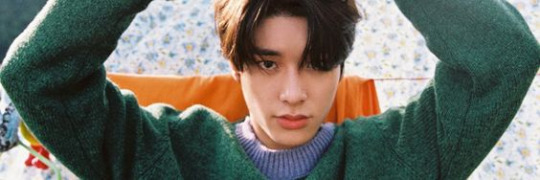
similar to jay, jake's dominant function may also be extroverted intuition (Ne)!! for him, a way he expresses it is more based on spontaneity. he also searches for ways to think out of the box instead of relying on what is already infront of him. another way extroverted intuition can be expressed is trying to experiment with the idea of new possibilities emerging.
additionally, as someone relying on extroverted intuition, he may prefer to think and learn about what he is handling before he puts anything into play. this narrows down jake as either an entp or an enfp. the difference between these two types is whether they prioritize feeling or thinking which are the judging functions.
of course, you can infer that thinking is more logical and objective and feeling is emotional and subjective. however, thinking may also be subjective, doing things like weighing pros and cons. feeling can also be objective to right and wrong and what is better in majority opinion.
jake may be more focused on one aspect instead of balancing in a bigger scheme. in comparison to jay's introverted feeling, jake may not be as global and may try to dive into what makes sense in his opinion and what makes sense to him, this is introverted thinking (Ti).
we can deduce the idea that jake is probably an entp! this leads his tertiary function to most likely be extroverted feeling (Fe). this causes jake to think about which theoretical possibilities are best to the majority of people and what is most culturally accepted. entp is also an example of introverted sensing (Si). aside from forgetfulness or disorganization, introverted sensing as an inferior function can also create high expectations of others and tunnel vision.
page of pentacles, temperance rx.

sunghoon on the contrary to jay and jake relies the most on what he already knows. his dominant function is introverted sensing (Si), what he wants the most is stability when faced with a problem. he may prefer to work the most on what is already known and may have a really good eye for details and consistency.
this presents two possiblities for sunghoon, he may either be an istj or an isfj! the difference between these two is similar to what i mentioned earlier in jake's portion! however since sunghoon's dominant function is introverted, making him appear introverted. his auxiliary function is extroverted, extroverted thinking and feeling is focused on making things happen.
sunghoon's auxiliary function is extroverted thinking (Te)!! as i mentioned in heeseung and jay's portion of the post, he looks to make plans that prioritize efficiency. he works with goals in mind and likes to have schedules, causing him to be brutally honest. when paired with his dominant function, his general approach can be to plan out ways to complete his goals in the most beneficial way while using methods that are already proven to be very successful.
sunghoon can be deducted as an istj!! this leads his tertiary function to be introverted feeling (Fi). introverted feeling as a tertiary function, especially with introverted sensing, may allow someone to work with even more conviction and take into account their morals on what types of traditions are right and wrong for a situation.
what he may find weakness in, as you can guess based on what i have mentioned, is straying from traditions and learning to think outside the box. he could lack in creativity and brainstorming, his inferior function is extroverted intuition (Ne). what i have not discussed yet about his function is an ability to see the meaning behind the actions of other people, which sunghoon may also be weak in.
four of pentacles, the lovers rx.

sunoo when presented a problem by rely on extroverted feeling (Fe). whereas jake will have to grow and develop his functions in order to look for a solution that is most globally and culturally agreed upon, for sunoo this is his first thought when he has to interpret something!! sunoo is best at and leans towards reading unspoken rules of society and the essence of deeper connections.
knowing this, the two possibilities for sunoo's personality are enfj and esfj. to elaborate more on why the first function is what concludes an introvert to a extrovert, sunoo's dominant function is extroverted. therefore, he would naturally act extroverted since his way of learning and interpretation is inductive; based on his experiences and physically sensing.
as for his auxiliary function, he could also rely on introverted intuition (Ni). as an auxiliary function this helps sunoo think and understand how meaningful his actions are in the big picture. this helps sunoo with thinking about how the majority of people would think of his actions. these two functions, introverted intuition and extroverted feeling, make sunoo comprehensive and universal thinker.
the combination above identifies sunoo as an enfj!! as an enfj, his tertiary function would be extroverted sensing (Se). when supporting extroverted feeling, extroverted sensing allows him to process his observations more clearly and help ground him in the present moment. this allows him to be adaptable and resourceful. on a side note, i find that in all of my readings of sunoo, he is very resourceful!!
finally, his inferior function is introverted thinking (Ti). when making decisions, sunoo can often not focus on a main point or subject or hyperfocus on a subject, no in-betweens. since his dominant function is extroverted, he would be more focused on larger ideas and have issues with putting his thoughts into words.
the high priestess, three of wands

jungwon may also dominantly use extroverted feeling (Fe)!! similar to sunoo, he is diplomatic. he focuses on putting his thoughts into actions instead of sizing it up or spending most time constructing a plan on how to handle it. most of his reactions to environments are emotional, so he works mostly for harmony and understands needs of people and how certain emotional variables affect a situation. in short, "how does this impact us all?"
jungwon's auxiliary function is introverted sensing (Si). he works in methods that are most commonly used and what he knows from experience. when he is in motion, he looks at steps as they occur. for example, when helping someone he may rely on solutions that would give the person not only a good impact and outcome, but also allow them to have a comfortable process.
putting these two together, jungwon may be identified as an esfj! in comparison to sunoo, jungwon is more drawn to the smaller details of a situation. even though both sunoo and jungwon gear their actions towards impacting the world around them, jungwon takes things step by step and aims for practicality.
his tertiary function would be extroverted intuition (Ne). part of the driving force to his aggressive approach to issues may be fuelled by curiousity. he may want to experiment and find ways to improve and change what is already established. this also helps him figure out which possibilities, by experimenting with variables and perspectives, are most universally and positively impactful!
therefore, his weakness could lie in introverted thinking (Ti), similar to sunoo. another way this shows is focusing on small details and working step by step, he could tend to over-analyze and trip himself up on things that are useless to him. this can also emerge as extreme perfectionism.
knight of cups, temperance
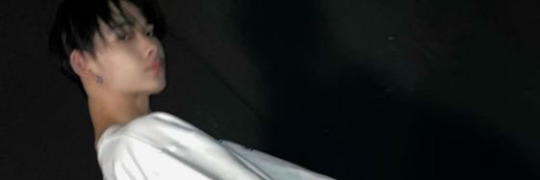
niki could be introverted sensing (Si) dominant!! as mentioned in sunghoon's portion, people who dominanting use introverted sensing may rely on what they already know. additionally with this dominant function, niki may also compare and contrast an issue to what he has already experienced and what he knows/thinks is true. he may be drawn to paying attention to details and relating the present to the past.
niki's auxiliary function could be extroverted feeling (Fe)! unlike sunghoon who relies on extroverted thinking, niki may think less on what is most efficient and looks at what would make the greater population happy. this helps niki with establishing good relationships and impressions on other people, as he would have a really good ability to read a room. he can also tend to adapt and mirror the emotions and energy around him.
what i have yet to mention is that while the dominant function is the most developed and tends to be the main drive and force of our character, the auxiliary function is how someone reaches out and interacts with other people. while niki thinks when making choices thinks about what he knows, he talks and handles people while thinking of what they want, he may be especially selfless.
seeing as niki can be identified as an isfj, we can now say his tertiary function is introverted thinking (Ti). in support of his dominant introverted sensing, niki may take his keen observations and think of ways to execute what he has in mind with rationalization. this also could give niki a really good ability for thinking with both logic and emotionality.
finally, as for his inferior function, extroverted intuition (Ne). niki may have weaknesses with over-speculation, or overall over-thinking. this can cause him to be restless and very suspicious of the world and people around him. he may also repress creativity and try to follow the rules as close as possible. when repressed, they can essentially explode, causing him to appear impulsive and careless.
king of cups, nine of cups rx.

why does mbti matter?
mbti is a way for us to see how we approach situations. we see our weaknesses and how we can improve on our thought processes.
why do majority of these not line up with the members' official mbti?
there are a couple reasons for this!! first, as i try to stress multiple times i found out their dominant and auxiliary functions with the use of tarot, i simply correlated the main concepts of the cards to each of the functions.
idols have a character/stereotype to maintain. truthfully, for marketing purposes it is most beneficial for them to act in ways that do not fully align with their thought process or become extremes of specific traits of their process. this post was also geared to introducing and educating the idea of jungian functions/stacking, rather than analyzing the every movements of the members.
what i did not delve into in this post were shadow functions as well. everyone actually utilizes all eight functions. everyone has layers and situations will arise that will cause someone to act 'uncharacteristically'. these shadow functions can make you defensive, self-doubtful, deceiving, and destructive.
the most common form of testing mbti is from testing oneself through websites or research. when dealing with matters including ourself, it may be difficult to objectively answer question based on your own actions and remove personal bias.
finally, it is important to note that mbti does not fully develop in a person until they reach around their mid-twenties. this causes healthy and unhealthy functions. for example, a healthy Ne dominant can use their thoughts and imagination to improve their life, while an unhealthy Ne dominant can be fully disconnected and discontent with reality.
does mbti change?
it is most commonly agreed that mbti does not change, people simply develop and gain healthy habits that help them learn to express each of their functions in the best/healthiest way.
#kpop tarot#enhypen tarot#enhypen jay#jay tarot#enhypen heeseung#enhypen jake#enhypen sunghoon#enhypen sunoo#heeseung tarot#jake tarot#sunghoon tarot#sunoo tarot#enhypen jungwon#enhypen niki#jungwon tarot#niki tarot
48 notes
·
View notes
Text
Nimona & Ballister Boldheart: The Exploration of the Relationship Between an ESFP & ISFJ

Nimona and Ballister’s relationship can be interpreted many different ways: a friendship, a father-daughter relationship… I’ve even seen them interpreted as a brother-sister relationship. However, the intriguing part about their personality types, is that they’re cognitive functions shadow each other.
What this means is while their cognitive functions are complete opposites of each other, the actual order stays the same. Their dominant function is sensing, their auxiliary function is feeling… and so on.
Se-Ni vs . Si-Ne

Nimona lives in the moment, while Ballister bases all of his decisions on his experiences. It is harder for Ballister to change his perspective on the world around him, because the rules of the guard is what he had always been taught. In fact, he doesn’t even begin to challenge the perspective, until his experiences begin to change, and he is able to look at the past with a new set of eyes.
This being said, Nimona can fail to understand Ballister’s cautious attitude, but Ballister can also struggle with Nimona’s impulsive decisions. Both, however, tend to be useful in different situations.
Nimona’s quick reactions often save Ballister from particular situations, while Ballister’s cautious approach to things is also what keeps him and Nimona safe during a lot of situations.
Fe-Ti vs. Fi-Te
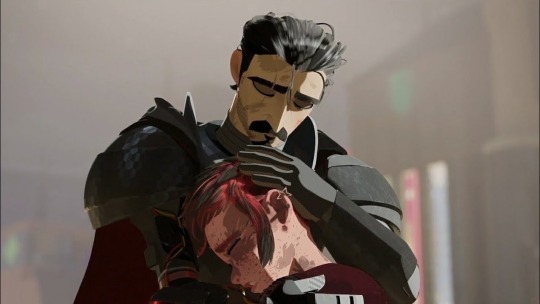
Ballister takes a while to challenge the social norms he grew around, while Nimona has been fighting against them from the beginning. What brings her to Ballister’s doorstep in the first place is the fact that he is an outcast, similar to her.
However, as Ballister grows to care about Nimona, the more he is willing to challenge the social norms. Out of everyone in the story, Ballister is the one to see past the “monster” in Nimona, and realize she is a human being with real emotions as well. He saves Nimona, not just by putting himself between her and the sword by letting her know she’s not alone.
While Nimona feels alone in her own emotions, Ballister is the one who is there to validate those emotions.
Why it’s important that Nimona and Ballister are shadows of each other.

Essentially, Nimona is there to challenge Ballister’s perspective of the world. Then having different values and different perspectives of the world around them is essential to the themes presented in the movie. Not only does Ballister keep believing in a system after it failed him, but he tries to fix the problem through the system.
It’s after he meets Nimona, that he realizes the system has consistently failed everyone, and it needs to be dismantled altogether.
12 notes
·
View notes
Note
tell me about your interest in mbti!!! it’s something I was really into when I was in hs so like. throwback. did you ever look at the 8 I forget what they were called functions or smth? like how there are introverted and extroverted versions of N, S, T, F eg as an infp (?) you’re Fi, Ne, Si, Te ??? and also. If you feel like writing an essay on how this works/crosses over/makes muddled idk with neurodivergence I’m all here for it!! goes without saying no judgement on how much or little you know, I’m just curious to see the angle you hit it with because it’s been a hot minute since I interacted with anything mbti and I miss it!
hiiii
omg FINALLY an mbti enthusiast lmaooo, i had my phase like last year (?) bUt i still remember a lot
theyre called COGNITIVE functions, actually, and yea there are eight:
fi - introverted feeling
fe - extroverted feeling
si - introverted sensing
se - extroverted sensing
ti - introverted thinking
te - extroverted thinking
ni - introverted intuition
ne - extroverted intuition
n each of the sixteen personality types has a dominant, auxiliary, tertiary, and inferior function
e.g. im an intp, so my cognitive functions are like this:
dominant function - introverted thinking (ti)
auxiliary function - extroverted intuition (ne)
tertiary function - introverted sensing (si)
inferior function - extroverted feeling (fe)
sometimes people get mixed up w the orders or what shows the most, so similar types get mixed up bc they have the same functions in different orders. for example, the most similar type to mine is entp, and the entp cognitive functions are like this:
dominant function - extroverted intuition (ne)
auxiliary function - introverted thinking (ti)
tertiary function - extroverted feeling (fe)
inferior function - introverted sensing (si)
im not sure how it crosses over w neurodivergency tbh, but i KNOW most everyone who knows abt this whole deal w cognitive functions is neurodivergent (including me lmao). i think its either bc nd people look for a way to make sense of people n understand them, or it could just be correlation n not causation lol
hope you enjoyed this :) i didnt rlly know what else to say except explain cognitive functions n shit lol
20 notes
·
View notes
Text
[HiGH&LOW MBTI]
Tsukasa Takajo: ISTJ

Serious-minded, thorough, and loyal. The Inspector.
Si dominant users apply information, then make it a system in their minds, and mobilize their Te auxiliary to help this system not collapse. Tsukasa is basically not a person who is comfortable with spontaneity and impulsivity. As Fujio's colleague, Tsukasa helps Fujio with thoroughness in checking the truth of information. This is important to balance Fujio's impulsiveness in order to minimize the negative impacts that will occur. Tsukasa prepared various pieces of evidence to support his argument against Mercy who wanted to refuse to give him information about Raoh. This is not a Ne function (INFP), but rather a Si-Te combination (ISTJ).
Tsukasa is used to Fujio's powerful energy, making it a driving force for Tsukasa to explore the world around him. Fujio is a guide for him, when the guide is not there, Tsukasa loses his direction. This forms a value (Fi) in him, that his existence is meaningless if Fujio is not there. Tsukasa's Si-Fi loop condition made him distance himself from people, lowering his self-confidence, to the point he thought that there was no future for him in Oyakou. When everything feels bad, his inferior Ne is forced to rise to help him get out of this condition.
#high&low#high&low the worst#high&low the worst x#high and low#high&low mbti#mbti#istj#mbti istj#tsukasa takajo#takajo tsukasa#yoshino hokuto#hokuto yoshino#character typing#high&low the worst cross#high&low mbti analysis#istj tsukasa
13 notes
·
View notes